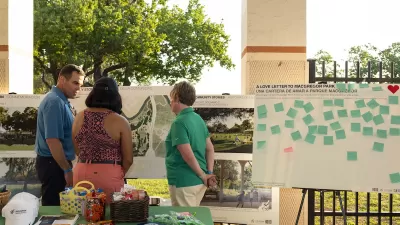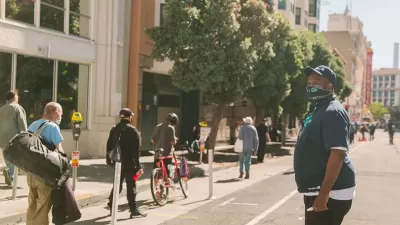Durham City Council members may be ready to take on new debt to fund a list of big-ticket parks and transportation projects which would help keep pace with growth and enhance the community.
The city of Durham is holding public hearings and informal talks with residents to get help prioritizing a list of 10 projects, with the goal of securing funding and moving forward with initial phases during the 2015-16 biennium. Individual project costs range from $5-50 million, with the total price tag upwards of $200 million. Some are still in the conceptual stage, and would be scaled based on priorities. Narrowing the list now will help refine scope and cost estimates and position the city for funding, which may include a potential revenue package such as short-term borrowing or tax increases.
The ten parks and transportation projects are central to the city's strategic plan [pdf], and would develop key linkages and mobility improvements, and supportive infrastructure for future growth and light rail. The strategic plan outlines key actions and investments to address goals of safety, economic vitality, livable neighborhoods, responsible governance, and well-managed assets. Proposed projects include streetscape enhancements, road widening, playfields, pools, recreation centers, greenways, sidewalks, and parking structures. Councilmembers want to ensure spending is spread equitably throughout neighborhoods, while also recognizing the need to improve the downtown core.
Durham grew by 20 percent over the last ten years. It is North Carolina's fourth largest city, with a 2010 population of 267,587. Its $375 million annual operating budget is funded mainly through property and sales tax.
FULL STORY: Council picking priorities for 10 big-ticket projects

Planetizen Federal Action Tracker
A weekly monitor of how Trump’s orders and actions are impacting planners and planning in America.

Maui's Vacation Rental Debate Turns Ugly
Verbal attacks, misinformation campaigns and fistfights plague a high-stakes debate to convert thousands of vacation rentals into long-term housing.

Restaurant Patios Were a Pandemic Win — Why Were They so Hard to Keep?
Social distancing requirements and changes in travel patterns prompted cities to pilot new uses for street and sidewalk space. Then it got complicated.

In California Battle of Housing vs. Environment, Housing Just Won
A new state law significantly limits the power of CEQA, an environmental review law that served as a powerful tool for blocking new development.

Boulder Eliminates Parking Minimums Citywide
Officials estimate the cost of building a single underground parking space at up to $100,000.

Orange County, Florida Adopts Largest US “Sprawl Repair” Code
The ‘Orange Code’ seeks to rectify decades of sprawl-inducing, car-oriented development.
Urban Design for Planners 1: Software Tools
This six-course series explores essential urban design concepts using open source software and equips planners with the tools they need to participate fully in the urban design process.
Planning for Universal Design
Learn the tools for implementing Universal Design in planning regulations.
Heyer Gruel & Associates PA
JM Goldson LLC
Custer County Colorado
City of Camden Redevelopment Agency
City of Astoria
Transportation Research & Education Center (TREC) at Portland State University
Jefferson Parish Government
Camden Redevelopment Agency
City of Claremont





























